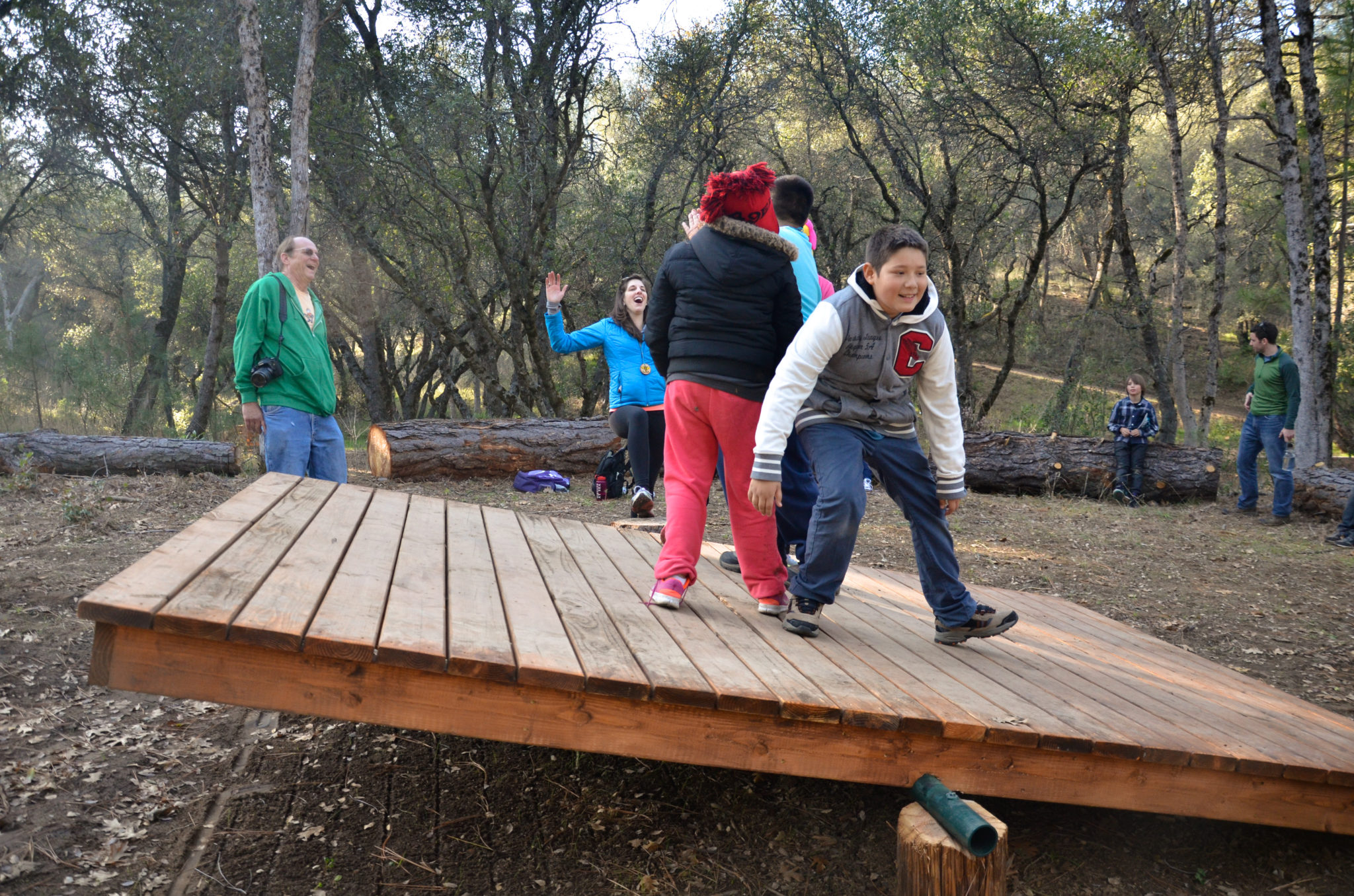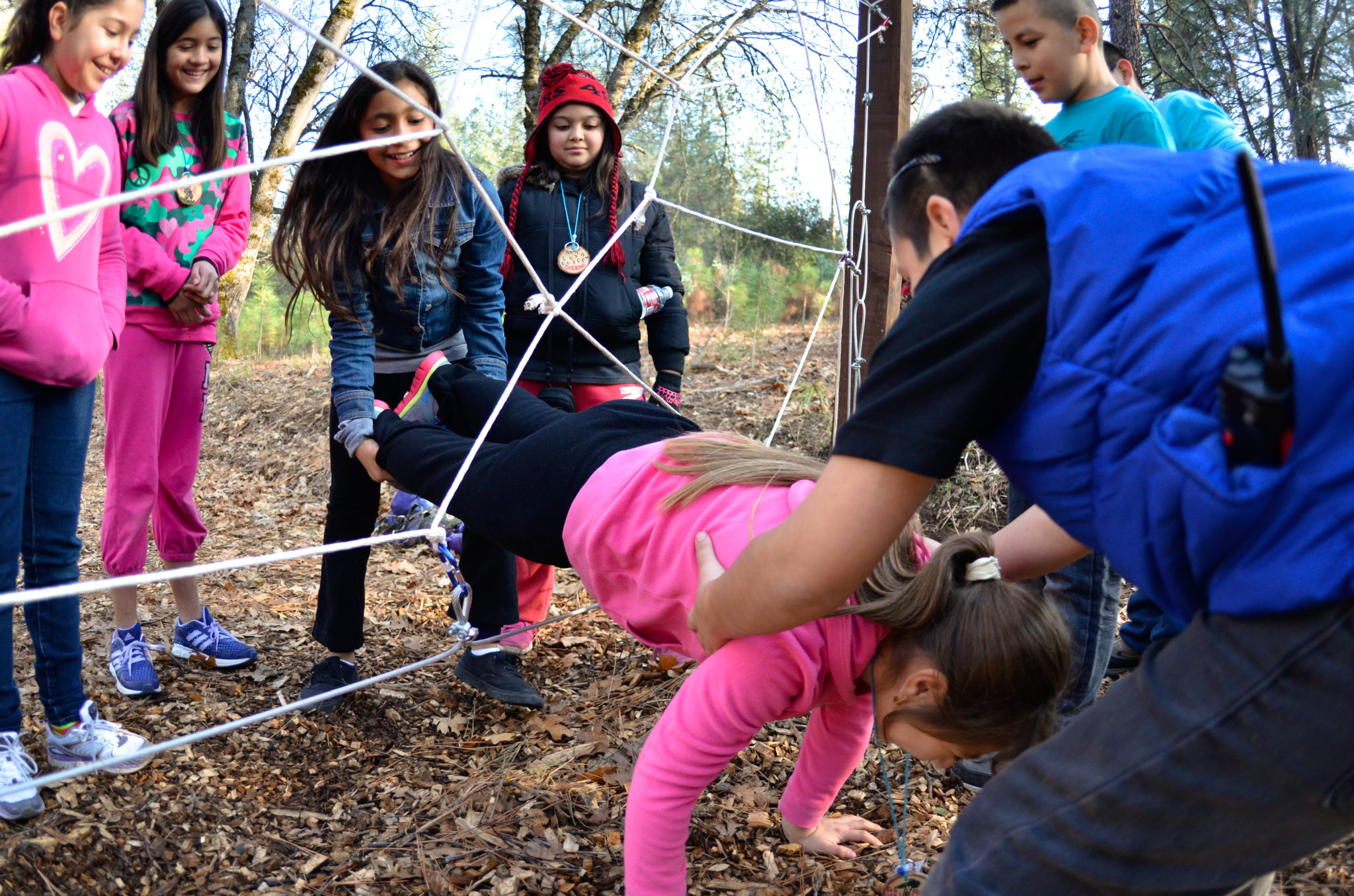
Blasting Beyond the Classroom Walls: 5th Grade Science Camp
by Kevin Bronk, Editor, Beyond
A great education blasts beyond the walls of the classroom. Fifth grade science camp does just that. Every year, all of our Bay Area fifth grade Rocketeers launch out of their comfort zones, contemplate their camp names (Speedy Turtle, Ms. Mountain Lion and Fuzzy Bear) and lace up their boots to explore the great outdoors together.
But what is science camp all about? I sat down with Jerry Baker, cofounder of Tuolumne Trails to find out. Tuolumne Trails is located on 80 beautiful acres of Sierra Nevada wilderness outside the mountain community of Groveland, California near the grandeur of Yosemite National Park. Originally designed for kids with disabilities, Tuolumne has grown to support a variety of programs, one of which is Rocketship’s Science Camp. Jerry and his small staff have hosted dozens of our outdoor adventures over the last three years. He offered me insights into the world of outdoor camp, but also into the fragility of life, the joy of learning and the power of discovery.
KB: How did you first become involved in outdoor school?
JB: My wife Paula and I were fortunate and able to retire early. I retired on my 50th birthday from the semiconductor business. But at 50, you’re not going to play golf for the rest of your life. We both knew we wanted to give back in some way.
If you backtrack 20 years from that time, our youngest son was diagnosed with a brain tumor. Fortunately, it was a happy ending and everything ended up just fine. But during that time, we were exposed to children with special needs. We spent a ton of time in hospitals going through five different surgeries. We came to understand that when you have a special needs kid, your life gets put on hold. But when it’s with a nine year old, they don’t ever get to be nine again — they don’t get that part of their life back.
So when we retired, that bubbled to the surface. We wanted to help disabled kids enjoy the normal things in life. Little by little, a simple camp grew into all of this.
It’s the engineer in me that always wants to do something bigger and better.
KB: So what is it that makes this, or any other, outdoor program successful?
JB: From what we’ve seen, there’s just a level of exposure that city kids often don’t get to the outdoors. I was a country boy; I didn’t realize there were places where you couldn’t just go hike. Giving kids the ability to see something they’ve never seen makes an outdoor program successful. We have kids coming from San Francisco who have literally never walked on green grass.
So we need to expose kids to even the simple things like finding what’s around that next bend…exploring that and discovering it.
There’s a social awareness around the environment that’s really important too. And while we’re dedicated to that, I think it’s really basic. Giving kids the ability to interact with a new environment without their parents and any potential negative influences in their local communities is key to them being able to learn and grow.
KB: In what ways do they grow?
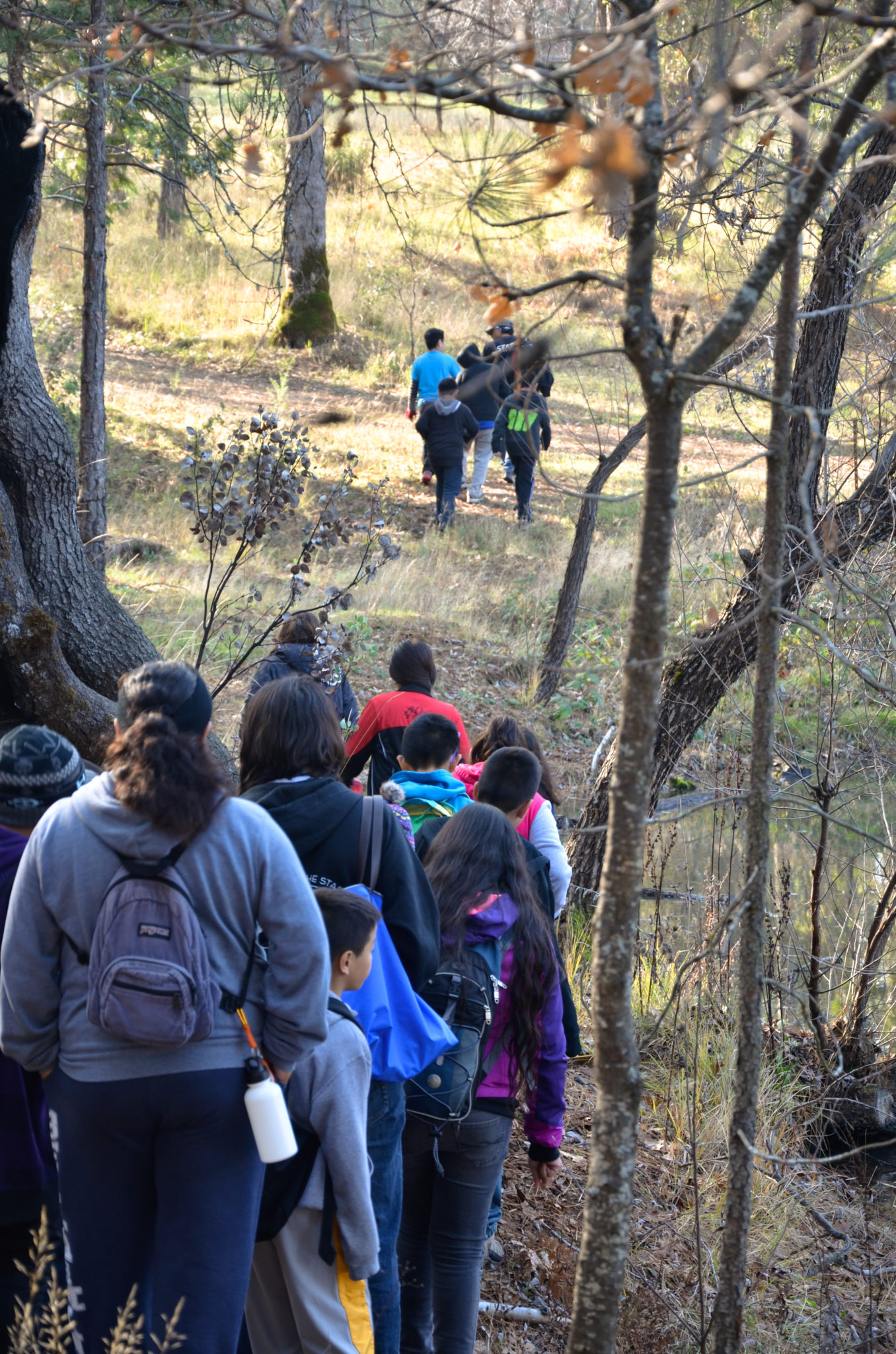 JB: First and foremost, kids gain a bunch of material while they’re here. They get to think about and do things at level they don’t get otherwise. There is a huge academic component where they get to learn about the weather, the stars and Indian history.
JB: First and foremost, kids gain a bunch of material while they’re here. They get to think about and do things at level they don’t get otherwise. There is a huge academic component where they get to learn about the weather, the stars and Indian history.
But there’s also the maturity that comes from being away from mom and dad. I’m very impressed with the Rocketship staff and the connections they build with the kids. It’s not a “mommy” connection; it’s more of an adult connection. There is responsibility held between the kids and the teachers. It impresses me to watch the big group sessions where the kids are not being talked down to, but rather addressed as responsible beings. There are real consequences to their actions out here and the work that the Rocketship staff does to make sure they are safe but still can gain that learning is really cool.
KB: Can you share a great camp memory with our readers?
JB: I was doing some science experiments with a small groups kids. We were doing some higher level things, a little greater than fifth grade level, and one of the kids comes up to me and says, “I want to be an engineer. I love science. And I’m going to be successful and buy my mom a house.” And I thought, there’s the American dream. And even to be a part of that, in the tiniest way, is powerful. And you know, when we left after a week of camp, the two of us had a teary goodbye. Maybe it wasn’t a pivotal point, but maybe it was just a little extra fuel in his tank to help him move along.
Every so often you realize all kids can use a little extra fuel and this camp is an opportunity. It’s up to the parents and teachers to continue that, but it’s good to help that process.
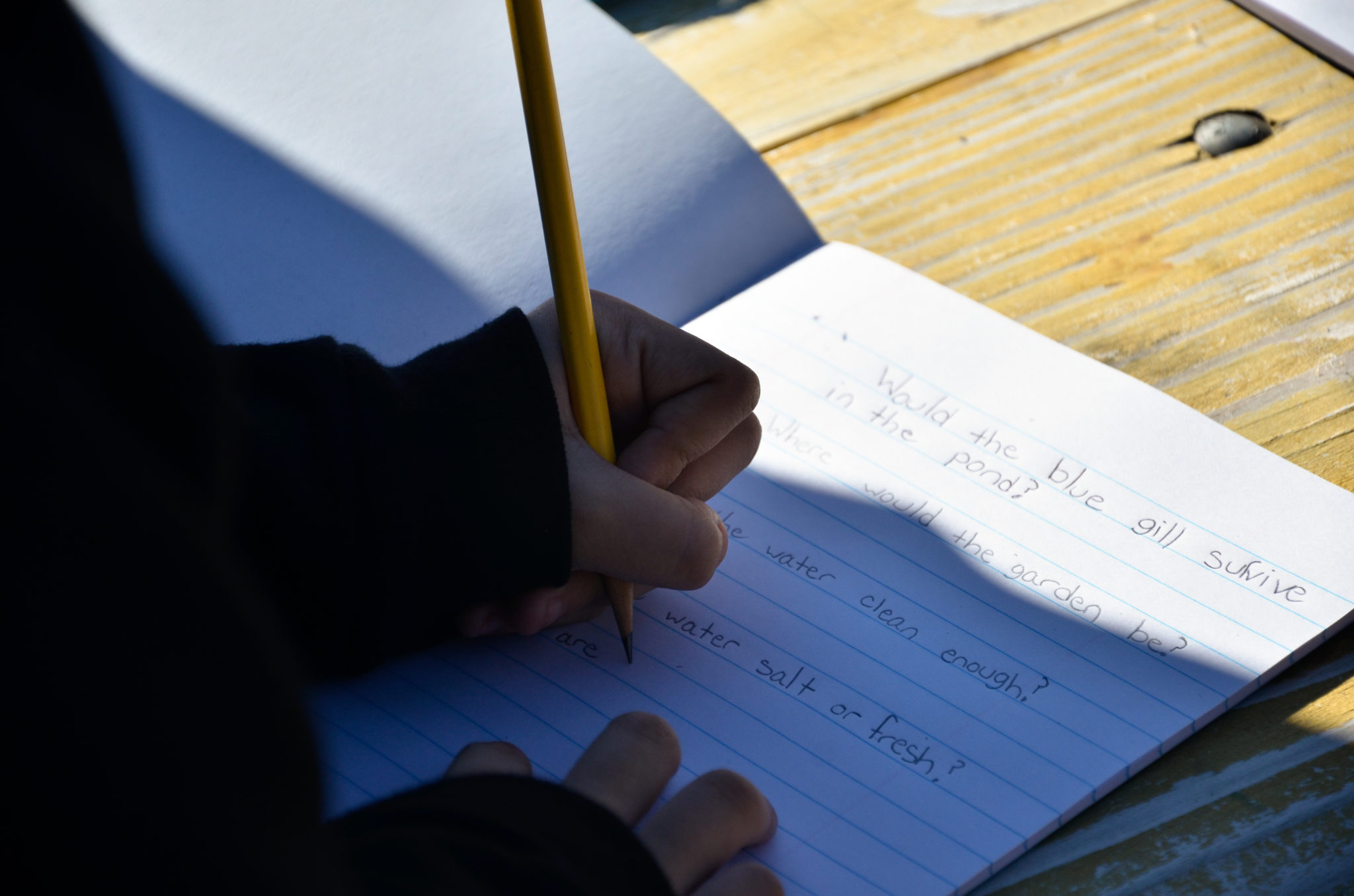
Using the scientific method, students solve challenges around the camp. Here, a small group is determining if the camp pond could sustain fish.
KB: At outdoor school, students experience science first hand. How is this different than what happens in the classroom, and why do we need both?
JB: One of the things that is true about most of our campers is that they come in on Monday excited, but apprehensive. Many of them may be too cool for school. You know, taking away their iPhone. Their first night at the camp fire nobody wants to sing. But by the time they leave, they’re playing the same silly camp games we played 50 years ago. It’s back to nature in a different way. There’s the nature of the leaves, but there’s also the nature of being a kid. It takes a while for kids to shed all the baggage they bring with them. It takes a while for us to let loose. It’s like the value of vacations, but with a learning experience.
You know when you step into the a classroom the bell is going to ring in 45 minutes. Here, with the immersion that gets involved, there is a continuation. There is a momentum you get to build on. All that going and stopping in the classroom just doesn’t make sense. The inertia that exists with kids allows us get the kids involved with stuff. When they go from one activity to the next, they continue to build their capabilities. It’s tough to accomplish that in four walls.
KB: What advice do you have for Rocketeers who may be nervous about their outdoor school experience?
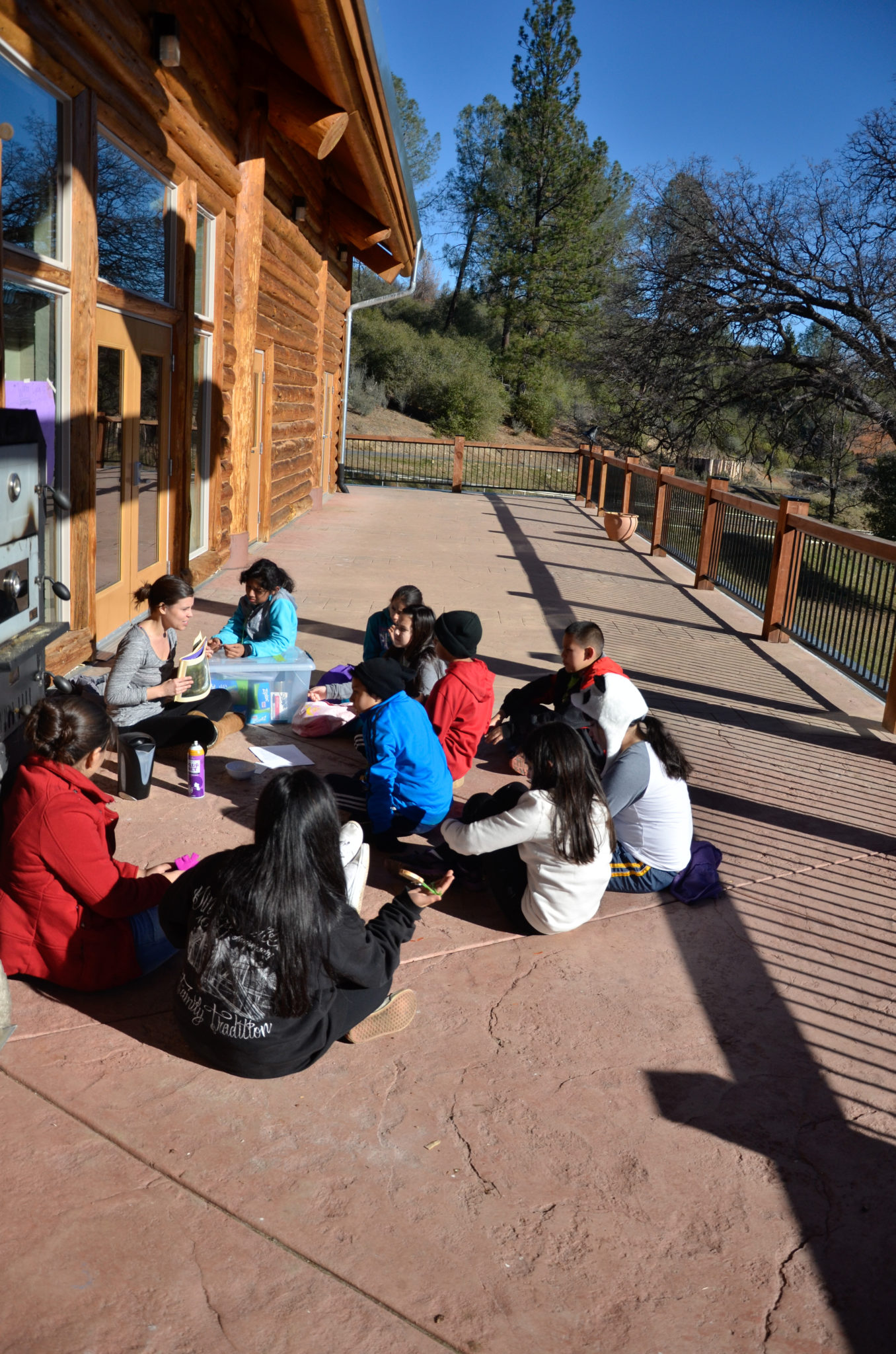 JB: The real simple answer is, this ain’t our first rodeo. We’ve dealt with all the issues before. We deal with some of the really hard stuff. We deal with the kids who can only eat through a feeding tube. The staff here has gotten used to being accommodating. It is very difficult to imagine a circumstance we can’t deal with. Everything is going to be just fine, mom [laughs].
JB: The real simple answer is, this ain’t our first rodeo. We’ve dealt with all the issues before. We deal with some of the really hard stuff. We deal with the kids who can only eat through a feeding tube. The staff here has gotten used to being accommodating. It is very difficult to imagine a circumstance we can’t deal with. Everything is going to be just fine, mom [laughs].
When you’re concerned about sending your kids to camp, ask yourself, are you concerned about them or are you uncomfortable as the parent? That’s totally fine, but we have to let these kids grow.
This is great experience for kids to be kids in the great outdoors. Lots of these kids don’t get this shot often. This is an amazing opportunity to jump on.
KB: Our Rocketeers really miss camp when they come home. What are some ways they can continue their outdoor school experience after camp has ended?
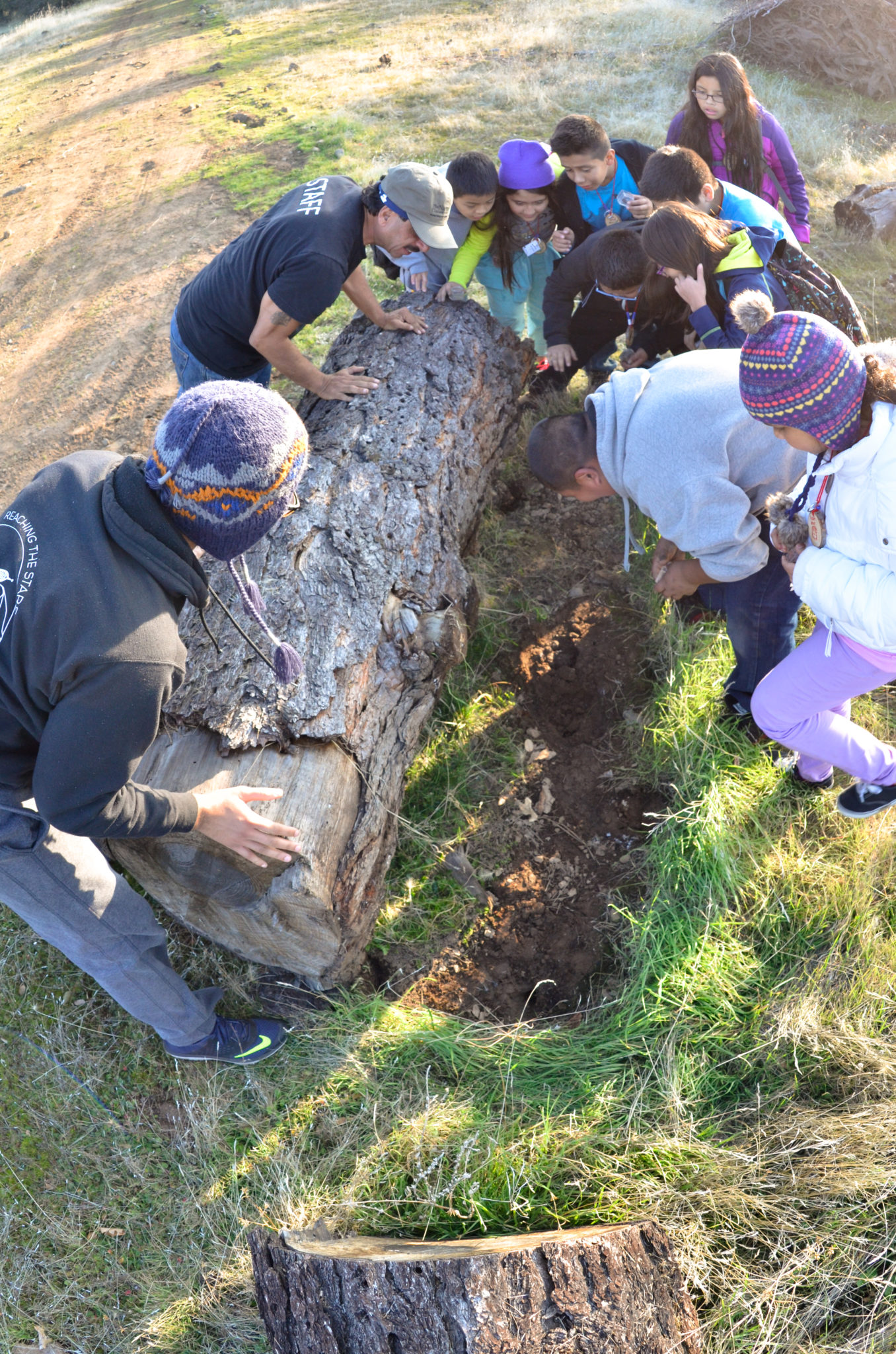 JB: We have trees here, and they have trees at home. Here there is an abundance of nature, but you’re never far from it. There is something to learn from nature, no matter where you are. Even if it’s more space in the concrete jungle, there are lots of things out there you can learn.
JB: We have trees here, and they have trees at home. Here there is an abundance of nature, but you’re never far from it. There is something to learn from nature, no matter where you are. Even if it’s more space in the concrete jungle, there are lots of things out there you can learn.
The stuff we do here is not super complex. It doesn’t involve lots of tools. Sitting down and doing things, even simple ones, like mixing vinegar and baking soda together, that are hands on is a great start. Work with your kids to learn with their hands. Continue the opportunities to do that. Go out and use a tree finder book to try to find out what kind of trees are around the corner. Go to the park and find out what all the trees are. I would encourage to get hands on learning involved. It doesn’t have to be pure science, it just has to be with your hands.
Think about how to be a good steward of our Earth when you go home. How can you take care of your environment and Earth?
Reflecting back on my business background, we were pretty serious about being great teachers and learners. We would do retreats similar to this, but we noticed when we got back to work, much of what we built got left behind. So we adjusted so that when we left the sessions or retreats, we spent time reflecting on how we could do things differently when we returned back to real life. We continued to talk about our experiences and share them with each other and the people who hadn’t experienced the retreat together. Students have the same opportunities. We can’t leave this to chance. There is a real risk that when you leave, you slide back to where you started. So parents, talk to your kids about camp. Push them to explain their lessons and continue that dialogue.
KB: What do you hope kids take away from science camp?
JB: I want them to learn how much fun learning actually can be. If kids can realize that, they will be successful. I don’t care as much about the technical skills, but more about the curiosity that will push them learn and discover. I think learning is fun. That’s what I want kids to get out of. They didn’t come here to learn AND have fun. They came here to have fun learning. All learning can be fun.
One of the things that I learned is that your right brain evolves through play. Your left brain evolves through reading and things like that. But you can’t learn to ride a bike by reading a book. You learn how to ride a bike because you’re having fun. As a society, we sometimes make learning a burden. It doesn’t work that way. Learning is fun and I hope science camp helps remind us all of that.
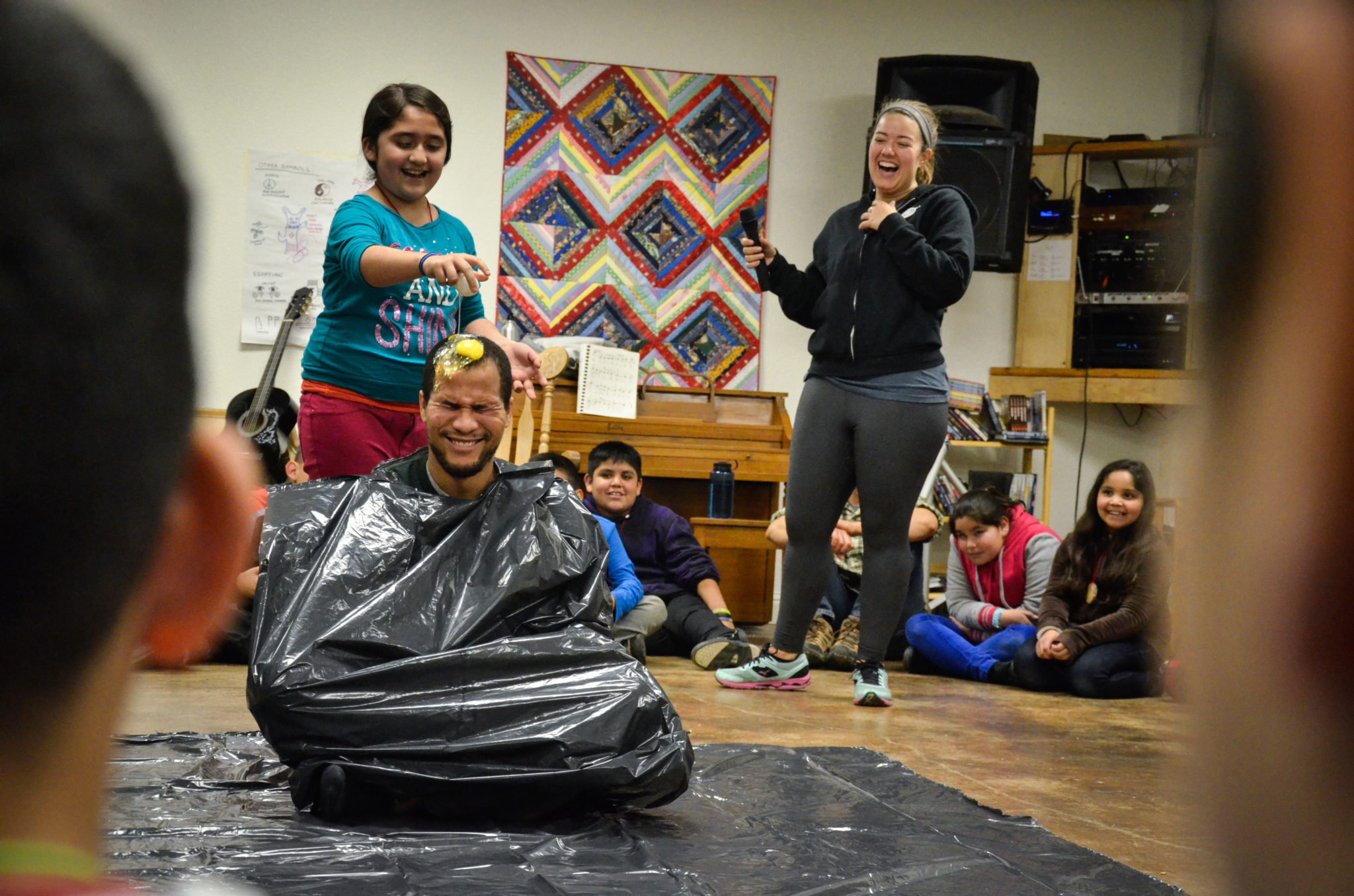
One of the first activities at Rocketship’s science camp is the EGGSperiment. Investigation groups of students must determine which of two eggs is raw and which is hardboiled. To test their hypothesis, a student from each group cracks the egg they believe to be raw on a councilor’s head.
KB: Any last thoughts you’d like to share for our readers?
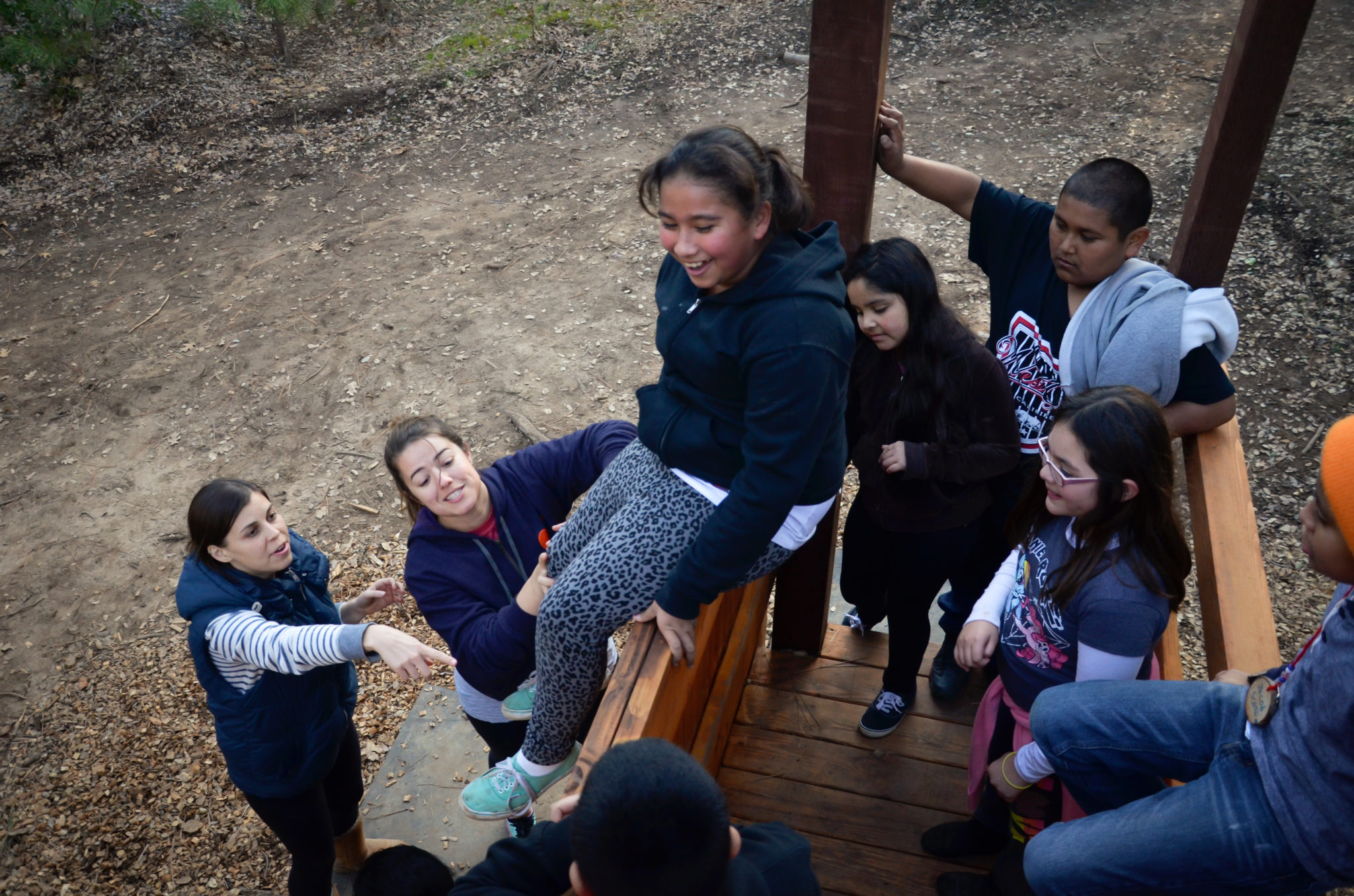
Ms. Merz (far left) and Ms. Johnson (right of Ms. Merz) designed science camp at Tuolumne Trails three years ago. While teachers for different schools take the lead for their respective camps, Johnson and Merz took the lead to ensure our Rocketeers could all enjoy this unique opportunity.
JB: I think one thing you may be bashful about taking credit for….we do a lot of science camps, but what’s unique about the way Rocketship runs science camp is that it’s run by the school. It’s not turned over to somebody they’ve hired to run the camp. Many schools do that. And there’s advantages to that, but the kids aren’t nearly as engaged.
Rocketeers get to see their teachers in a different — often silly environment — which helps so much with engagement and investment.
I hope parents understand that this program has been built around their kids’ needs by their teachers, by people who know and love their kids. I can understand the resistance to sending your kids away to strangers, but here, you’re sending your kids off with adults who love them and have a relationship with your child.
This is a pretty unique situation with Rocketship. This whole thing has been built from the ground up for Rocketeers.
That’s something that should happen more. This is something other schools can do…it just requires a lot of time, energy and thoughtfulness. I hope more schools will do this. The teachers are so excited about it, it’s hard for us not to be too. It just took somebody at Rocketship to stand up and make it work.
KB: So what do other schools need to do to get involved with science camp?
JB: You got to have a champion. You got to have the support. But if you have those, we’ve stolen the Rocketship lesson plans. We steal knowledge shamelessly [laughs]. Because you guys have pioneered self-run camps, the hard work has been done. It’s not that expensive and it’s proven in terms of it’s success. So we’re happy to share it with you.
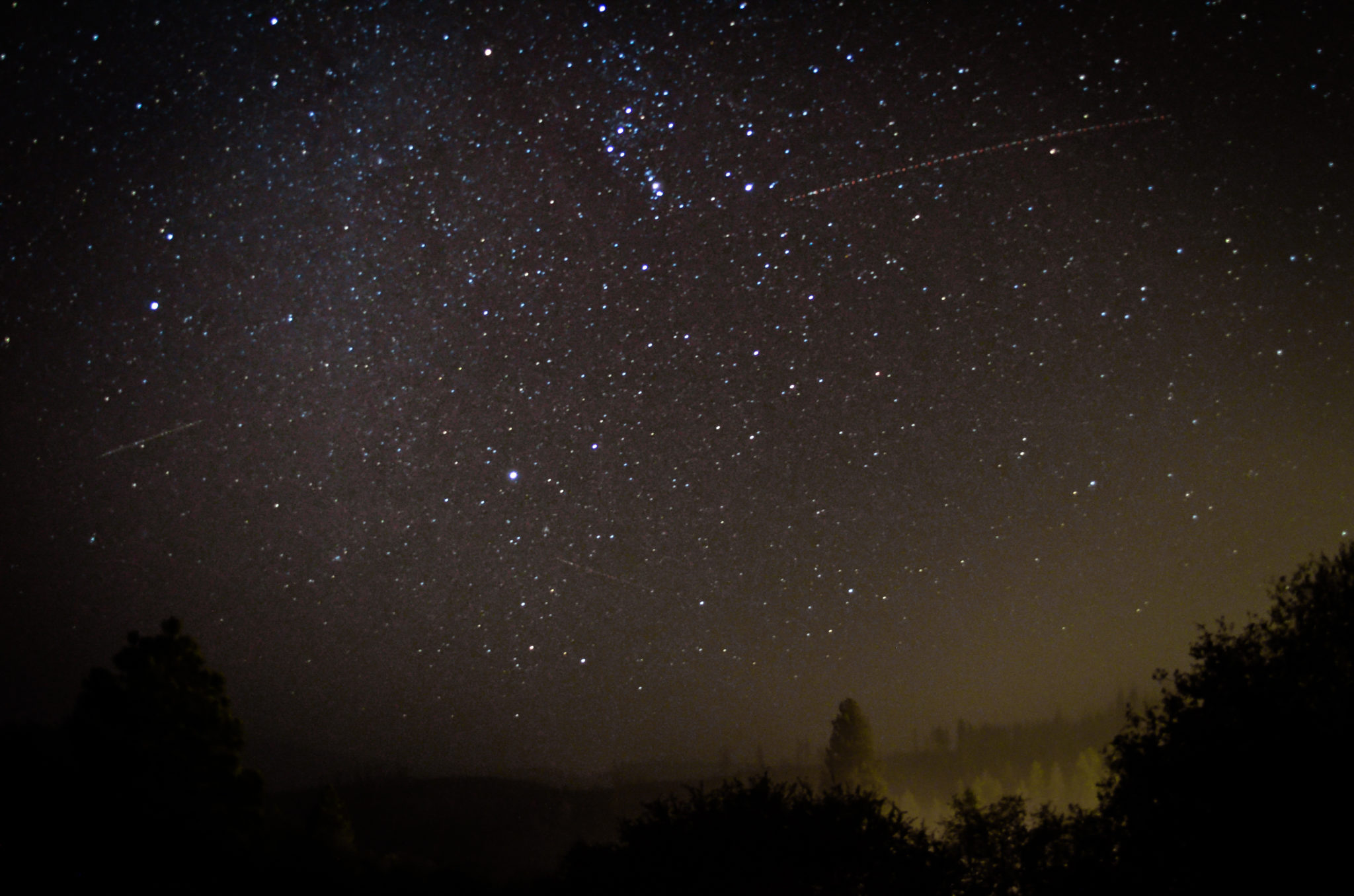
Escaping urban light pollution, Rocketeers have the opportunity for night hikes, using only the stars for guidance.
Kevin works on the Rocketship Network Support Team and is the Editor of Beyond. He is a former Special Education teacher in San Jose, with experience teaching in both traditional public and Rocketship schools. He earned a BA in Journalism and Digital Arts from the University of Oregon. A current Bay Area resident, Kevin is passionate about education, story-telling and creative exploration.
Published on January 26, 2015
Read more stories about: Most Popular Stories, Personalized Learning.


